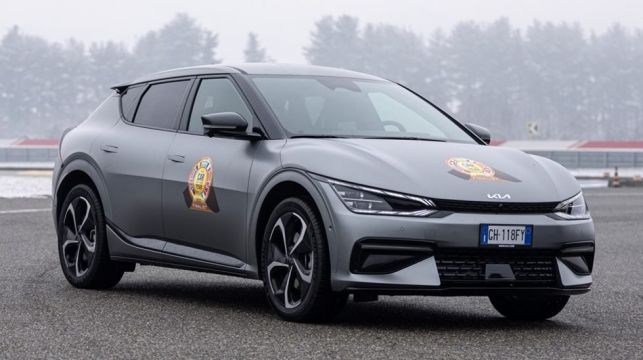Kia’s EV6 all-electric crossover has been named Europe’s Car of the Year. In a tightly fought race with the Renault Megane E-Tech and Kia’s Korean cousin the Hyundai Ioniq 5, the EV6 took the coveted title from the longest-running car award in the world.
New all-electric models dominated the shortlist in this year’s competition. From a list of 39 new models - 18 of which were electric vehicles - arriving on European markets this year, the seven finalists were (in alphabetical order): Cupra Born; Ford Mustang Mach-E; Hyundai Ioniq 5; Kia EV6; Peugeot 308; Renault Megane E-Tech; and Skoda Enyaq iV.
The two Korean finalists - Hyundai’s Ioniq 5 and Kia EV6 - share the same technology, while the Skoda Enyaq and Cupra Born share the same MEB platform from its Volkswagen parent, albeit with notably different driving characteristics.
Ford’s finalist was its long-awaited all-electric rival to the Tesla Model Y, while Renault continues its impressive run of electric models with a crossover take to the new Megane range.
Peugeot’s new 308 was the only finalist powered by a range of regular combustion engines.
Eligible cars must essentially be new models, available in at least five European countries before the end of 2021. Jury members had 25 points to allocate in a public vote - with a maximum of 10 to any one car. The members must also explain their voting decisions.
The final score was:
| Kia EV6 | 279 points |
| Renault Megane E-Tech | 265 points |
| Hyundai Ioniq 5 | 261 points |
| Peugeot 308 | 191 points |
| Skoda Enyaq | 185 points |
| Ford Mustang Mach E | 150 points |
| Cupra Born | 144 points |
The war in Ukraine impacted this year’s awards. “We have discussed it within the jury and the majority decision to suspend the two Russian jury members from this year’s contest,” explained Frank Janssen, president of the Car of the Year jury. However, the suspensions did not impact on the final rankings.
As a member of the jury my votes went as follows:
Cupra Born - 1 point
A noticeably more sporty iteration of VW’s ID.3, it has sharp styling, but lacks the performance bite that Cupra showcased on the Formentor.
Ford Mustang Mach-E - 2 points
Ford got a lot right with this Mach-E. Certainly the exterior styling is a winner as is the car’s handling, where once more the blue oval brand proves itself the mainstream masters. As with the petrol-powered Mustang, the premium pricing and non-premium cabin are a drawback.
Hyundai Ioniq 5 - 8 points
Futuristic styling, smart performance, family spaciousness and a battery range that tends to live up to its promise combine with competitive pricing to make this a winner.
Kia EV6 - 6 points
Marginally sharper handling than its Korean cousin - perhaps due to the lower stance. The Hyundai has the more practical cabin and futuristic looks, however, to give it the edge.
Peugeot 308 - 1 point
Lovely looks and lively engine range that bridges the gap to the EV future. Up against pure EV rivals, however, it seems a little like Peugeot played it safe.
Renault Megane E-Tech - 5 points
Another big surprise from Renault with a car that delivers crisper handling than we’ve come to associate with the brand’s mainstream models. This is combined with gorgeous styling and decent electric range thanks to some smart weight-saving engineering. Inside there’s a real leap towards premium finish with this cabin. The ride can be choppy on uneven surfaces however, and for all its hatchback appeal, the back row in either a VW ID.3 or Cupra Born is more welcoming to passengers.
Skoda Enyaq iV - 2 points
Skoda’s take on VW Group’s EV platform puts family functionality to the fore. It looks more traditional than its VW cousins, but that suits some buyers. A practical family crossover built on a platform that’s a proven winner in terms of comfort.







